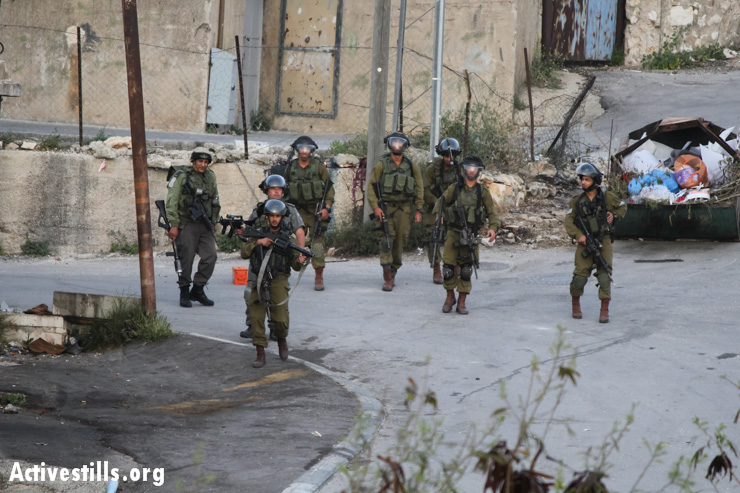29 January 2016
The torment of truthful Palestinian journalists in the Zionist entity
Image - caption. BRAVE ZIONISTSIsrael has a history of targeting journalists either with live ammunition or otherwise by abducting them. In the last year alone, 574 attacks against Palestinian journalists by Israeli forces have been catalogued, two of which resulted in death. Currently there are at least 17 Palestinian journalists caged in Israeli prisons. Mohammed al-Qiq is one such journalist.
Mohammed al-Qiq is a reporter for Al Majd TV in Palestine. Mohammed has been targeted by the Israeli occupation forces for his critical reporting of the illegal occupation.
At 2am on the morning of 21st November 2015 Israeli soldiers stormed his home in Ramallah, blowing up the front door of his house where he and his wife and their two young children, aged just 3 years old and 1 years old, live. The soldiers shackled and blindfolded him before taking him to the illegal Beit El settlement where they kept him in the open air without shelter for 20 hours. He was then moved to the infamous Russian compound of Jerusalem prison for torture and later the torture continued at the notorious Al Jalame interrogation centre near Haifa in Israel.
Amnesty International reports that he was tortured during his interrogation, that "he was subjected to a stress position commonly known as the “banana”, which involves being tied in a contorted position to a chair, that he was tied to a chair for up to 15 hours at a time and that he was threatened with sexual violence by his interrogators, who told him that he would not see his family for a long time unless he “confessed” to the allegations against him."
On the fourth day of torture Mohammed al-Qiq launched an open hunger strike in protest of torture.
After being tortured for 25 continuous days Mohammed al-Qiq was transferred to isolation cells at Megiddo prison whilst still being on hunger strike. At Megiddo on 17th December 2015 he received a six-month administrative detention order.
Administrative detention is a vile form of internment where Palestinians are caged indefinitely without charge or trial on never ending administrative detention orders month after month, year after year. Israel's use of administrative detention - largely as a punitive measure - is illegal under international law.
Prisoners are left on rolling detention orders which can be anything from 1-6 months, renewable indefinitely. So for example administrative detainee Mazen Natsheh has been locked up cumulatively for nearly 10 years without charge or trial. Detention orders are based on so called "secret information" which never needs to be produced, either to the detainee nor their lawyer. Administrative detention is often used to arbitrarily jail Palestinians where there is no evidence for a trial. It is also used for punishment as in the case of Palestinian MPs who are often caged to punish them for their political stance. Amnesty International consider that "Israel’s use of administrative detention itself may amount to cruel, inhuman and degrading treatment".
Israel has on average issued over 2000 detention orders every year (between 2007 and 2011). Today there are 660 administrative detainees languishing in Israeli prisons.
As Mohammed's health deteriorated under hunger strike, having lost 22kg in weight, he was transferred to Ramleh prison clinic. He saw his lawyer for the first time at military court on 24th December - over a month after he had been abducted. He had to be brought to military court in a wheelchair as by then, through torture and hunger strike, he had lost the ability to walk. The military court, which has a conviction rate for Palestinians of 99.74%, rejected appeals to release him and confirmed that he had been abducted due to his journalism, accusing him of 'incitement' through his media reports.
As his health became critical he was moved to HaEmek Hospital in Afula on 30th December where he was pressured to break his hunger strike. Amnesty International reports that "the Israeli authorities have consistently responded to hunger strikers with punitive measures aimed at pressing them to break their hunger strikes, in some cases amounting to torture or other ill-treatment."
On 10th January 2016, Israeli prison guards in the hospital shackled both Mohammed's hands and both his legs to his bed and held him down, despite his extremely fragile state, whilst blood was forcefully taken from his right arms and an intravenous drip was inserted into his left arm by colluding Israeli doctors. Amnesty International has condemned the hospitals actions stating that "Carrying out a medical procedure against the patient’s wishes is a breach of medical ethics, and the way al-Qiq was treated in hospital violated the prohibition of cruel, inhuman or degrading treatment or punishment."
Mohammed family have not been able to visit him once since his arrest. Like most Palestinians from the West Bank, Mohammed is being held in Israel in violation of the Fourth Geneva Convention, his family cannot visit him without a permit issued by the Israeli military.
Mohammed's life is now critical, he has lost consciousness and there is fear of imminent organ failure. Israel is threatening to force feed him - a violent practice which has in the past resulted in the death of five Palestinian prisoners. The World Medical Association has condemned force-feeding of hunger-strikers as 'tantamount to torture'.
Mohammed isn't the first Palestinian journalist to be abducted by Israel and held without charge or trial. Just last month Palestinian journalist Nidal Abu Aker was finally released after being held for 18 months without charge under administrative detention. He only secured his freedom after going on hunger strike last August. His crime was to host a radio programme at the Sawt Al-Wehda radio station called "In their cells" to draw attention to the plight of Palestinian prisoners. That apparently "constituted a threat to the security of the Israeli state". Without food for over a month, Nidal wrote from his prison cell:
"From inside my dark, dreary, small cell, that is very similar to a grave, where my bed touches the walls from both sides, I stress that this narrow cell will not narrow my will. My will is spacious and my spirits are high, drawn from the support of my family and our people, as well as the justice of our cause."

